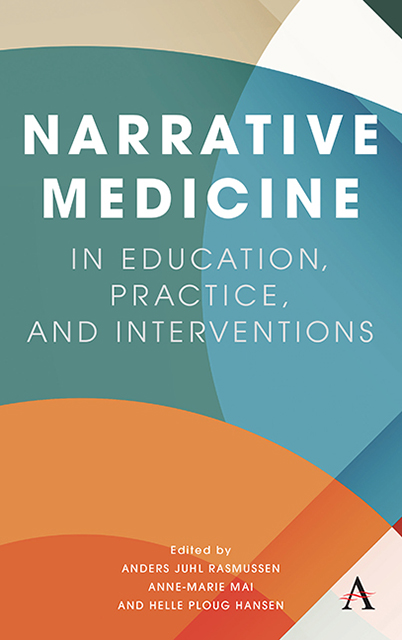Chapter 4 - Prescribing Stories before Medicine. Narrative Medicine in the Teaching of Medical Students and Physicians
Published online by Cambridge University Press: 08 June 2023
Summary
This chapter takes as its point of departure the mandatory course, Narrative Medicine, introduced on the medical program of the University of Southern Denmark and uses it to discuss the importance of the humanities and art to medical education. The chapter starts by presenting two aims of narrative medicine as an academic field: physicians’ empathy with their patients and physicians’ improved self-care. The first part of the chapter describes the hypotheses, methods and aims of narrative medicine. Methods of close reading and creative writing provide training for a sharpened receptivity towards and understanding of what patients are trying to say about their illness. Against a background aim of increasing or maintaining the narrative sensitivity of physicians, the chapter discusses a variety of studies in empathy research. The second part of the chapter focuses on the doctors’ need for self-care. The opportunity to create a recreational space for reflection can be found, for example, in Rita Charon's idea of keeping a “parallel journal” or through reading of authors like the physician Richard Selzer. The chapter's intention is to present humanist methods and art as essential parts of medical education and, more specifically, to promote an acceptance of narrative medicine as being more than an add-on to the medical student's “evidence-based” program.
The history of medical education and practice has rediscovered its humanist core on a number of occasions (Osler, 1961; Charon, 2006; Heslet, 2010; Bleakley, 2015). Edmund Pellegrino, one of the leading figures in medical ethics of his time, has given a striking expression to the link: “Medicine is the most scientific of the humanities, the most empiric of arts, and the most humane of the sciences” (Pellegrino, 1979, p. 17). Regardless of whether illness is interpreted as an abstract pathophysiological, biomolecular, epidemiological, or algorith-mic construction, physicians need to understand it in relation to the patients’ lived experiences and to the narratives they tell. To put it briefly and somewhat polemically, even the best medicine does not work for the “wrong” illness narra-tive (Rasmussen and Sodemann, 2020). The primary aims of narrative medi cine, understood as courses for the qualification and in-service training of physicians, are to raise awareness of and promote the clinician's empathy with individual patients, understood first of all as human beings, by arousing curiosity about and understanding the accounts they provide of their illness and distress.
- Type
- Chapter
- Information
- Publisher: Anthem PressPrint publication year: 2022



